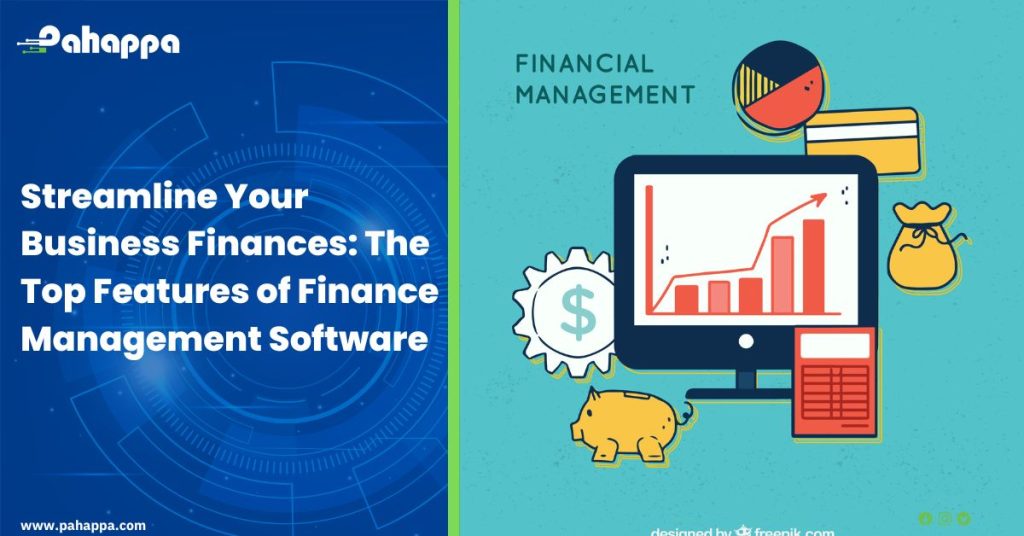Finance management software can be a valuable tool for streamlining your business finances. These applications help you manage various aspects of your company’s financial operations, from accounting and budgeting to invoicing and expense tracking. Here are some of the top features to look for in finance management software:
- Accounting and Bookkeeping:
- General ledger: Keep track of all financial transactions in one place.
- Chart of accounts: Organize your accounts for various income, expenses, and assets.
- Double-entry accounting: Ensure accuracy by recording both debit and credit entries.
- Invoicing and Billing:
- Create and send professional invoices.
- Automate recurring invoices.
- Track payments and send payment reminders.
- Generate estimates and quotes.
- Expense Management:
- Record and categorize expenses.
- Capture receipts digitally.
- Set expense policies and approvals.
- Monitor expense trends and patterns.
- Budgeting and Forecasting:
- Create budgets for different departments or projects.
- Track budget vs. actual performance.
- Forecast future revenues and expenses.
- Bank Reconciliation:
- Sync with your bank accounts to reconcile transactions.
- Detect discrepancies and resolve them.
- Financial Reporting:
- Generate various financial reports like balance sheets, income statements, and cash flow statements.
- Customize reports to meet your specific needs.
- Payroll Management:
- Calculate and process employee salaries.
- Handle taxes and compliance.
- Maintain employee records.
- Tax Management:
- Automate tax calculations and deductions.
- Generate tax forms and reports.
- Stay updated with tax law changes.
- Multi-Currency Support:
- Manage transactions in different currencies for international operations.
- Automatically update exchange rates.
- Integration with Other Software:
- Security and Compliance:
- Ensure data encryption and secure access controls.
- Comply with financial regulations and standards.
- Collaboration and User Roles:
- Assign different access levels to team members based on their roles.
- Collaborate on financial tasks and approvals.
- Cloud-Based Access:
- Access your financial data from anywhere with an internet connection.
- Ensure data backup and disaster recovery.
- Mobile Accessibility:
- Use mobile apps to manage finances on the go.
- Automation and Workflows:
- Automate routine financial tasks and workflows.
- Set up rules and triggers for specific actions.
- Scalability:
- Choose software that can grow with your business.
- Customer Support:
- Access to reliable customer support for troubleshooting and assistance.
- User-Friendly Interface:
- Intuitive and easy-to-navigate design for non-financial experts.
- Data Analytics:
- Use data analytics tools to gain insights into financial performance.
- Third-Party App Integrations:
- Connect with third-party apps and services like payment gateways, e-commerce platforms, and more.
Choosing the right finance management software depends on your business needs, size, and industry. It’s essential to research and compare different options to find the one that best suits your specific financial requirements. There are many benefits to keeping your business finances together. Streamlining business finances offers several advantages that can help improve efficiency, reduce costs, and enhance overall financial health. Here are some of the key benefits:
- Improved Financial Visibility: Streamlining financial processes provides better visibility into your business’s financial health. With organized financial data and reporting, you can make more informed decisions and detect financial issues early.
- Time and Cost Savings: Streamlining financial tasks reduces the time and effort required for manual data entry, reconciliation, and reporting. Automation can save you money by reducing the need for additional staff or outsourcing.
- Enhanced Accuracy: Automation reduces the likelihood of human errors, which can lead to costly mistakes. Accurate financial records are essential for compliance, tax reporting, and decision-making.
- Better Cash Flow Management: Streamlining processes can help you monitor cash flow more effectively. Timely invoicing, efficient collections, and optimized payment schedules can improve your cash flow and liquidity.
- Increased Productivity: By automating repetitive financial tasks, you can free up your staff to focus on more strategic and value-added activities, contributing to increased productivity.
- Compliance and Risk Management: Properly streamlined financial processes can help ensure compliance with tax laws, regulatory requirements, and financial reporting standards. This minimizes the risk of penalties, fines, and legal issues.
- Data Security: Centralizing financial data and automating processes can enhance data security. Implementing secure practices and software can protect sensitive financial information from breaches or theft.
- Scalability: Streamlined financial processes are more adaptable to growth. As your business expands, you can more easily manage larger volumes of financial transactions and data.
- Strategic Decision-Making: Access to accurate and timely financial data enables better strategic planning and decision-making. You can identify trends, opportunities, and areas for improvement.
- Customer and Vendor Relationships: Streamlining your finances can help you maintain better relationships with customers and vendors. Prompt invoicing and payments can foster goodwill and trust.
- Reduced Stress: Managing finances can be stressful, especially for small business owners. Streamlining financial processes can reduce stress by providing a clear and organized financial system.
- Competitive Advantage: Efficient financial management can be a competitive advantage, as it allows you to operate with lower overhead costs and allocate resources more strategically.
- Easier Audits and Due Diligence: Streamlined financial records make audits and due diligence processes smoother and less time-consuming. This can be crucial for attracting investors or potential buyers.
- Business Continuity: In times of crisis, having well-organized finances can be crucial for business continuity. You can quickly assess your financial situation and make informed decisions in challenging circumstances.
- Sustainability: Efficient financial practices can help your business reduce waste and become more environmentally sustainable by cutting down on paper usage and unnecessary resource consumption.
Overall, streamlining business finances is essential for maintaining financial health, reducing operational inefficiencies, and positioning your business for growth and success. It can save time, money, and resources while promoting transparency, accuracy, and compliance. To learn more about Finance Management Systems, click here.











